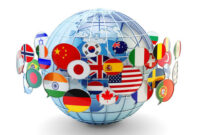What is Globalization?
What is Globalization?
The reasons behind the conceptual difficulty of identifying globalization in exact terms of what it is and what it does, lie in the cyclic logic used to define it. Most researches on globalization tend to extract the meaning of globalization from the effects it has on a society’s economy, political sphere, culture and the like. For example, a particular society’s culture can be studied and the traits of globalization as might be found in them can be attributed back to the definition of globalization. Robertson (1990) found globalization to be the ‘form’ by which the world became ‘united’. The perceived unity of the world gives globalization a definitional quotient, that of a ‘grand unifier’. But this unity happens through different channels, varied planes of understanding. The multiple layers associated with globalization must be identified and addressed separately yet under a conceptual whole to decipher the meaning of the word. Tomlinson (1999: 22) for example identifies this multi-dimensionality as a natural concomitant of what he terms ‘complex-connectivity’. However, he also points out that to understand globalization its multi-dimensionality must be reduced to a single dimension (Tomlinson, 17). But this reductionism cannot be sweeping in its scope. What Tomlinson underlines is that an analysis of a single dimension for example, culture as a part of the complex-connectivity associated with globalization—helps to identify globalization in relation to that specific dimension.

So the question remains: what is globalization? Without going into the debates concerning the problematic definition of the term itself, it can be roughly identified as a non-linear phenomenon based on accumulation, ordering and restructuring. It has no ‘top’ or ‘bottom’, no ‘start’ or ‘end’. Globalization has no fixed point of departure from any previous historical socio-economic processes. It is much like a circle with no point of initiation or completion. In fact globalization is a form of forced social evolution. It is man-made and yet its development and effects are natural to the extent that the results follow naturally from within the idea. It is an ideational construct encompassing all aspects of the modern (some would say post-modern) society. The idea of a ‘globalizing world’ in academic spheres relate to a ‘shrinking’ of distances, of a ‘time-space compression’; a world where connections between and amongst people have become so easy, rapid and intricate that the ‘territoriality’ associated with the term ‘space’ has lost its relevance. Globalization in effect means becoming a part of the globe, not the world. This distinction is essential in marking the chief trajectory of the concept. World is the real-time association that we have presently. An association with the self and the surroundings, the ‘immediates’ such as family, friends, offices, clubs etc, where there is no place for the ‘others’, the strangers, the unknown. Globe as a word signifies the unity of mankind, of the people living on the planet. It is a universal attachment to a particular social life/being. Here, you take notice of someone in a different country a thousand miles away, or are affected by the economic downturns they are facing. Here, you develop ties and bonds with the other, the ‘non-immediates’. Globalization thus becomes the process by which you become one with the globe.
But how did this significant change come to happen? How did the Hobbesian ‘selfish, nasty and brutish’ individual come to terms with such a magnanimous connectivity where existence is supposedly more about the ‘other’ than the ‘self’?
Sadly it turns out that this beautiful thought of becoming one with the globe was a by- product of an agenda, an ideology. As noted earlier globalization has no fixed point of initiation but that it evolved from the historical socio-economic processes already in place. Globalization can be traced out from the inherent human tendency to look beyond, move forward and expand his senses. In a crude explanation it can be said that the roots of globalization were in human romanticism i.e. in the beauty of knowing the unknown. From deriving mere aesthetic pleasures this slowly made way to the greater socio-economic implications with the unrestrained movements of human beings, capital, information and culture. As human knowledge increased the dissemination of such knowledge became a priority along with movements. In the 16th century Europeans established worldwide trade connections and started spreading their culture. On the other hand movements also resulted in territorial expansion and domination. Especially during the late 19th century period along with the rise in migration, trade increased and so did the formation of new norms and orders upon different colonies. After the end of World War II colonies created due to such expansion entirely on the basis of economic and material gains (the high ideal of disseminating knowledge or the romanticism associated with discovery has long died) gained independence and complete political sovereignty. What also happened was that the links, institutions that were in place during the colonial period transformed in to cultural residues, remnants of consciousness from the past (Lechner and Boli, 2004).
However, the imperialist drive of the colonial powers riding on the back of military prowess had to wither away with the acceptance of core and intrinsic human values e.g. freedom etc. legalized through international organizations as the United Nations.
But capital as an entity itself remained and kept on flourishing with the help of capitalist- industrialist societies, largely associated with the Western world. The collapse of the communist bloc in the early 1990s with the end of the Cold War saw the completion of capitalism as an accumulative and regenerative mechanism. But capitalism cannot flourish without new markets; newer territories must be conquered by capital for it to survive. Thus the military dimension of imperialism gave way to the economic imperialism through capital. Globalization as we experience it today originates specifically through the brisance of such a capitalist explosion situated in the commodity-plenitudes, mass consumption patterns etc. Featherstone’s (1990) formulation that globalization is not a form of cultural imperialism driven by economic imperialism can be contested only when we are talking about globalization as it started anew in the late 1990s. With the help of technological inventions in communication, information-sharing gathered immense speed and thus globalization became truly ‘global’. Globalization had thus gone through several phases in history before it reached the present state. It had evolved through time.
Scholte (cited in Greig: 2002) on the other hand identifies three distinctive descriptions of globalization. First, globalization involves cross-border internationalization, effectuating increase in the movements of people, goods, ideas, thoughts, capital, technology etc. Second, globalization is described as amounting to or resulting in removals of barriers to large-scale movements of those previously stated items. As such, here globalization itself becomes a by-product of the removal of barriers. The third conception of globalization sees it as transcending borders diminishing territories and distances. Rupal Oza calls this ‘the simultaneous solidification of global flows and the consolidation of the local identities’ (2006, 4). This is termed the ‘global-local nexus’ or ‘ glocalisation’, one of the chief claims of globalists, where the global and local interactions submerge, transcending and bypassing any national level interactions.
2.1 Nature of its existence
To understand globalization we also need to acknowledge the many varied planes of understandings that at times run counter to each other and at times collide. The literature on globalization can be divided into three distinct theoretical understandings: (i) globalists/hyper-globalists, (ii) radicalists/ inter-nationalists and (iii) transformationalists (Held 2004: 22-24). Globalists and hyper-globalists have a fixed belief on the might of the globalization which they think is spreading affluence all over the globe. Globalists and the hyper-globalists have fixed belief in the occurrence of globalization. It is a new phenomenon like none other and it is here to stay. Globalization is a fad which is slowly making its way to each and every corner of the globe. It is the path towards a global development; through globalization comes the power of emancipation, freedom and through freedom the right to seek changes and to join the global forces of change. By joining the globalizing forces the poor and the downtrodden can slowly attain equality with the rich and the wealthy. Equality comes through the demonstrative ability to perform. Globalization provides the power to demonstrate the capability to join the market. Thus, states have lost their sovereign power over its subjects as the market (now ever more vibrant with economic transactions of unprecedented magnitudes) decides the fates of individuals. If the state tries to counter the forces, the resulting exclusion of it from the developing global changes would render it obsolete. The state thus learns to obey the market. For globalists, the state is losing its importance tremendously and we are not far away from witnessing a state-less world society run by the ‘invisible hand’ of the market. Globalization, according to the globalists, is here to stay and to help.
The radicalists believe that globalization is not a new phenomenon. It’s rather a continuation of past histories when we used to have such trade interactions. Also, the power of the nation-state is far from over. States are building new institutions to counter the increasing inter-nationalism. Radicalists or inter-nationalists on the other hand are completely opposite in their understanding. Hirst and Thompson (1999), Waltz (1999) and others have argued that globalization is nothing new as far as its occurrence is thought to be a late 20th century novelty. They have shown that globalization as we define it today with relation to connectivity, increased economic transactions, growth in international trade and investments, cultural exchanges etc was present for over two centuries. In their viewpoint nation-states are becoming all the more important in the increasingly enmeshing global-regional-local networks.
Transformationalists on the other hand think that globalization is happening and the nation-states realizing that they are not the be-all and end-all of modern politics, are adapting themselves to the currents. They are united in their views about the natural instinct of the state to survive through transformations and unearthing newer measures to counter the globalizing forces of change. This transformation is different than mere structural adjustments to suit the immediate needs of the day. This is a complete makeover of the value-systems, power distributions, state-society relations, private- public distinctions etc in order to make the state ready for the next era of post-modern politics. This doesn’t only involve the new ‘information society’ (Castells: 1997; Kumar: 1991) or the ‘risk society’ (Beck: 2000) but the post-industrial and post-modern de- territorialized state-society where borders are porous but present, helping to retain the most precious national cultures and sentiments which stay territorially bound. This is discussed later in greater detail.
The biggest political claim of globalization is that it has resulted in the death of the state. In fact, such a claim ceases to be just political in nature when the reasons behind it are analysed. Claims about the declining nation-states touch political, economic and cultural sides of globalization. The following chapter discusses the nature of the modern nation- state with globalization as perceived by the three different planes of understanding and investigates the truth behind such statements.



